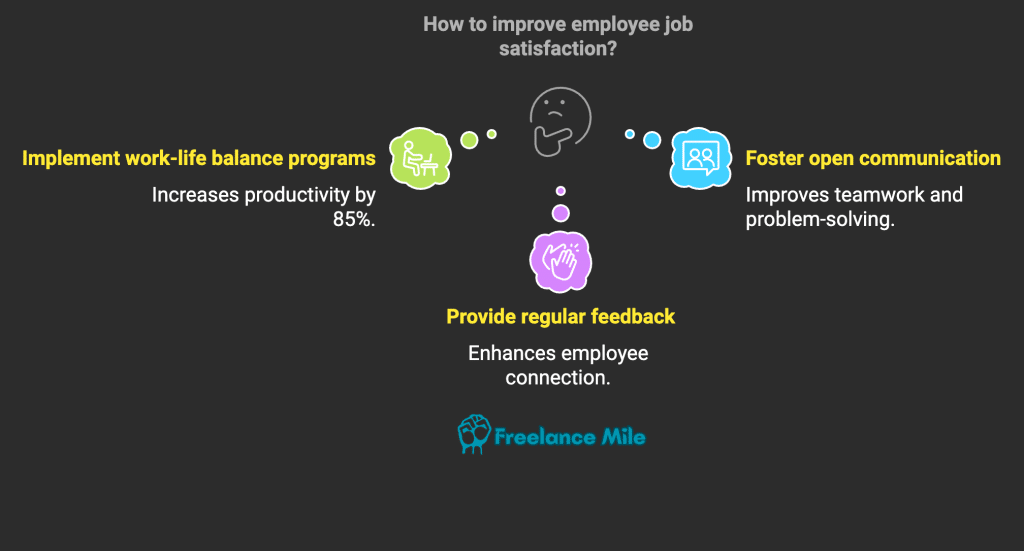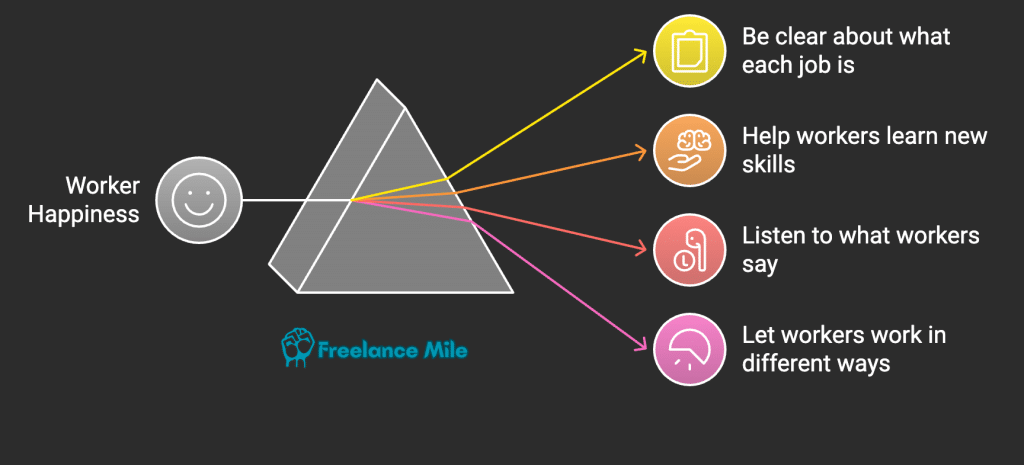The main reasons for job dissatisfaction in 2024 are bad working conditions, office politics/internal dynamics and not having freedom. Also, not getting enough recognition and no chance for growth are big issues. These problems make employees unhappy and less engaged at work.
To find out more, read the article below. If you have questions about job dissatisfaction, leave a comment, and I’ll help.
Job happiness is very important in today’s work world. Only 51% of workers say they are very happy with their jobs. This shows a big problem with job unhappiness and how it affects work and success.
It’s key to know why people are unhappy at work. Employers and employees need to tackle these problems. By doing so, companies can make a better work place. This will make employees happier and work better.
Key Takeaways
- Poor working conditions significantly impact job satisfaction levels
- Lack of autonomy can lead to lowered employee engagement
- Recognition and feedback are crucial for maintaining job satisfaction
- Limited growth opportunities contribute to workplace dissatisfaction
- Addressing these issues can boost employee retention and performance

What Are the Top Four Causes of Loss in Job Satisfaction?
Job satisfaction is very important in your work life. Knowing what can make you unhappy helps fix problems. Let’s look at the top four reasons for job dissatisfaction.
Office Politics and Internal Dynamics
According to my personal experience, team dynamics and office politics greatly affect job satisfaction. Even with your best efforts and honesty, a bad leader can change everything. Favoritism, gossip, and unfair treatment can turn a workplace into a toxic place.
Poor Working Conditions
Your work place affects your day a lot. Bad or unsafe places can make you stressed and upset. This includes things like bad equipment, too much noise, or no good facilities.
Lack of Employee Autonomy
Feeling watched too much or having no say in your work can be a downer. Having control over your tasks makes you feel valued. Without it, you might feel less interested in your job.
Inadequate Recognition at Work
Being recognized for your work is key to being happy at your job. If your hard work is ignored, you might feel unhappy and unappreciated. Getting regular thanks and recognition keeps you motivated.
One Additional but Important Cause is:
Limited Career Advancement Opportunities
Seeing a chance to succeed in your career is important. Feeling stuck with no way to move up can make you want to leave. It leads to feeling disconnected and looking for new chances.
Fixing these four main issues can make you happier at work. Employers who make work better, give freedom, recognize effort, and offer chances to grow have happier workers.
Understanding Job Satisfaction and Its Importance
Job satisfaction is very important in the workplace. It’s about how you feel about your job. It affects you and your company.
Definition of job satisfaction
Job satisfaction means feeling good about your work. It’s not just liking your job. It’s feeling fulfilled and valued in your role.
Recent studies show that 51% of workers are happy in their jobs. This is the highest number ever.
Impact on employee performance and retention
Your job satisfaction affects how well you do your job. Happy employees work better and stay more engaged. In fact, 80% of employees who like their managers are more likely to stay.
Job satisfaction also helps keep employees from leaving. When you’re happy, you don’t want to look for other jobs. This saves companies money and keeps important knowledge.
Role in organizational success
Job satisfaction is crucial for a company’s success. Companies that make employees happy see many benefits:

By focusing on job satisfaction, companies can create a positive work environment. This leads to growth, innovation, and success for everyone.
The Current State of Job Satisfaction in 2024
Job satisfaction trends in 2024 show a mixed picture of work today. Only 51% of workers are very happy with their jobs. This means 49% are not as happy, with 37% somewhat happy and 12% not happy at all.
What people want from their jobs is changing. Almost 60% would take a lower-paying job they love over a higher-paying job they don’t like. This shows that things like company culture and balance are more important than money.
Fast changes in work are making people unhappy. More than 50% feel too much change at once. And 44% don’t get why these changes are needed. Almost half of workers say they have more work now than last year.
| Factor | Percentage |
| Employees feeling extremely/very satisfied | 51% |
| Workers overwhelmed by workplace changes | 50% |
| Employees confident in job security | 60% |
| Workers using GenAI at work | 61% |
But, 60% of workers still feel secure in their jobs. The use of generative AI is also changing things. With 61% using it, many expect it to make their work easier in the next year. This could make them happier at work.
Poor Working Conditions: A Major Contributor to Job Dissatisfaction
Your workplace is key to your happiness at work. Bad working conditions hurt comfort and work quality. In factories, 65% of workers are unhappy because of bad air and safety risks.
A safe and healthy place to work is vital for your well-being. Companies that focus on safety and comfy workspaces have happier workers. This means good lights, right temperatures, and comfy chairs.
Here are things that make a good work place:
- Good and honest leaders
- Good lights and air
- Comfortable temperatures
- Comfy chairs and tools
- Clean and clean places
- Safe rules
Improving these areas can really help workers feel better and work better. Companies that make their work places nice and safe have less people leaving and more workers caring about their job.
| Industry | Major Dissatisfaction Factor | Percentage Affected |
| Manufacturing | Poor working conditions | 65% |
| Technology | Lack of growth opportunities | 48% |
| Healthcare | High workload and insufficient staffing | 70% |
| Finance | Inadequate compensation | 55% |
By fixing these work place problems, bosses can make work better for everyone. This leads to happier workers and better work results.
The Impact of Lack of Autonomy on Employee Satisfaction
Workplace autonomy is key for happy employees. When workers make their own choices, they feel more in control. This makes them happier at work.
Defining autonomy in the workplace
Autonomy means workers get to decide how to do their jobs. They can pick how to finish tasks and manage their time. Studies show they feel more satisfied and engaged.
Consequences of micromanagement
Micromanagement is the opposite of giving workers freedom. It can cause big problems. A Gallup survey found 76% of US workers feel burned out.
This lack of freedom can lead to:
- Less productivity
- More days off
- Health issues
- Workers feeling left out
Strategies for increasing employee autonomy
To make workers happier, employers can:

These steps can make workers do better, come up with new ideas, and stay longer. Gartner’s HR survey 2023 said giving workers freedom can make them perform 2.4 times better.
Recognition and Feedback: Essential Elements for Job Satisfaction
Employee recognition and feedback are key to job happiness. A 2023 study by Blueboard found that 67% of workers feel unappreciated. This can make them unhappy and less motivated.
To fix this, employers should give regular feedback. This includes reviews and public praise for good work. Giving constructive criticism helps employees get better and stay interested in their jobs.
Showing appreciation makes workers loyal and committed. Saying thank you for a job well done boosts happiness. This makes employees want to keep doing great work.
| Element | Impact on Job Satisfaction | Implementation Strategy |
| Employee Recognition | Increases motivation and loyalty | Public acknowledgment of achievements |
| Performance Feedback | Improves skills and engagement | Regular performance reviews |
| Workplace Appreciation | Fosters commitment and satisfaction | Create a culture of gratitude |
| Constructive Criticism | Enhances professional growth | Provide specific, actionable feedback |
Don’t forget, timely promotions and keeping promises are key. By using these strategies, you can make a workplace where everyone feels valued and wants to do their best.
Career Growth and Advancement: Key Factors in Employee Contentment
Career development is key to job happiness. When workers see a clear path for growth, they stay engaged. Companies can create a culture of advancement and keep workers motivated.
Importance of Professional Development
Investing in employee skills is good for everyone. Training boosts performance and shows you care about their growth. Companies that focus on learning see a 52% productivity boost and 17% more profitable.
Creating Clear Career Paths
Workers need to know where they’re going. Without a clear path, 22% leave their jobs. To keep them, map out career paths and check in on goals.
Implementing Mentorship Programs
Mentorship helps with career growth. It offers guidance, support, and networking. Good mentorship boosts promotions and reduces turnover. It’s great for diversity and inclusion in leadership.
| Factor | Impact on Job Satisfaction | Employee Retention Rate |
| Clear Career Progression | 79% increase | 85% |
| Professional Development Opportunities | 63% increase | 78% |
| Mentorship Programs | 58% increase | 72% |
Focus on these areas to create a nurturing work environment. A workforce that sees growth opportunities will stay and contribute to your success.
Additional Factors Contributing to Job Dissatisfaction
Job satisfaction is more than just a job. The culture at work is very important. Let’s look at some key things that can make your job better or worse.
Work-life Balance Issues
Having a good balance between work and life is key. In the U.S., people don’t use about 765 million vacation days each year. This can cause burnout and make you less productive.
Companies that offer flexible hours and encourage breaks have happier workers. These workers are more engaged and productive.
Inadequate Compensation and Benefits
Getting paid fairly is important for job happiness. Feeling underpaid makes you want to look for another job. It can cost a lot to replace an employee, up to two times their yearly salary.
This shows how important it is to offer good pay and benefits.
Poor Management and Leadership
The way leaders lead affects the workplace culture. Bad management can make the workplace unhappy. This can make people less motivated and less willing to work together.
Trust, respect, and being open are important for happy employees. Without these, people are less happy at work.
| Factor | Impact on Job Satisfaction | Potential Solution |
| Work-life Balance | 765 million unused vacation days annually | Encourage time off and flexible schedules |
| Employee Compensation | High turnover costs (0.5-2x annual salary) | Offer competitive pay and benefits |
| Leadership Style | Decreased motivation and collaboration | Promote trust, respect, and transparency |
Working on these areas can make people happier at work. Companies that care about their employees’ well-being do better. In fact, 94% of employees would stay longer if their company helped them grow.
Strategies for Improving Job Satisfaction in the Workplace
Boosting job satisfaction is key for a better workplace and keeping employees. Studies show what really matters to workers. Pay is important, but it’s not the most important thing for happiness at work.
A positive work environment is crucial. Gallup found that having close friends at work can make you 50% happier. This shows how important it is to build strong team bonds. Strategies should aim to create a supportive culture.
Workplace stress costs U.S. businesses $190 billion a year in healthcare. To fight this, offer flexible schedules and remote work. These help employees balance work and life better.
| Strategy | Impact |
| Fostering workplace friendships | 50% increase in satisfaction |
| Offering flexible schedules | Improved work-life balance |
| Recognizing achievements | Enhanced employee engagement |
| Streamlining meetings | Saves 31 hours per month per employee |
Recognition is a strong tool too. Celebrate what employees do well with big announcements or perks. It makes them feel valued and energized, more than just money.
Using these strategies can greatly improve job satisfaction and help the whole company do better.
FAQ
What are five unethical behaviors found in the workplace and how do you affect the development of a company?
Unethical behaviors in the workplace can severely hinder a company’s development by damaging its reputation, decreasing employee engagement, increasing turnover rates, draining resources, and disrupting employee relations. Common examples include manipulating data, taking excessive breaks, bullying colleagues, bad leadership, and failing to uphold transparency.
Such behaviors lead to a toxic environment that can lead to decreased morale & productivity, ultimately affecting the bottom line.
Can task changes affect job satisfaction through qualitative job insecurity and skill development?
Task changes can indeed affect job satisfaction through qualitative job insecurity and skill development. While task changes may initially increase feelings of insecurity regarding job roles and responsibilities, they can also provide opportunities for skill enhancement.
However, if not managed well, these changes may lead to decreased job satisfaction due to heightened anxiety about job security and unclear expectations regarding new tasks.
What are some tools that employers can use to improve employee satisfaction in the workplace?
Employers can utilize various tools to enhance employee satisfaction in the workplace. Effective strategies include conducting employee satisfaction surveys to gather feedback, implementing one-on-one meetings for personalized communication, and utilizing performance tracking tools like Time Champ to help employees manage their workloads efficiently.
Creating a positive work environment through genuine communication and recognition also plays a crucial role in fostering employee satisfaction.
Conclusion and Future Predictions
The future of work is changing fast. Job satisfaction trends are leading this change. As work places change, what employees want from jobs is changing too.
Studies show happy workers do better than unhappy ones. Happy workers do their jobs better.
The future will focus more on mental health at work. Happy workers are healthier and less stressed. Companies that care about this may keep their workers longer and work better.
To meet what workers want, companies need to make work places better. Things like good bosses, interesting work, and feeling important matter a lot. By improving these, companies can make their workers happier and more loyal.






